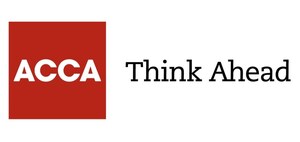New ACCA Report: Ethical Behavior Should Be At Core Of Business In Digital Age
NEW YORK and LONDON, Aug. 10, 2017 /PRNewswire/ -- Organizations must put ethics at the heart of securing public trust in the digital age, finds a new global survey released today by ACCA (the Association of Chartered Certified Accountants).
Ethics and Trust in a Digital Age, which surveyed 10,000 finance professionals and ACCA students in 158 countries, raises questions about how prepared businesses are to face new ethical challenges, such as ransomware attacks, crypto-currency transactions, intellectual property disputes, and customer privacy.
You can read the survey here or at http://www.accaglobal.com/gb/en/professional-insights/pro-accountants-the-future/Ethics-and-trust-in-a-digital-age.html.
"Professional accountants are often on the frontline of facing ethical questions in business," said Maggie McGhee, Director of Professional Insights at ACCA. "What is clear is that the digital age creates new dilemmas where there are no easy answers. If you're working in a business considering whether to start accepting bitcoin payments, or implementing cloud-based customer records, these are crucial questions. In the digital age, there needs to be more—not less— importance placed on the ethical and professional judgment of individuals."
She added, "What many are calling for is guidance and leadership on how to respond. All those involved in decision-making levels in business should be aware of how new technologies can affect their reputation and consider how to support their employees in doing the right thing."
The survey explores six digital themes: cyber security; platform based business models; big data and analytics; crypto currencies and distributed ledgers; automation, artificial intelligence and machine learning; and, procurement of technology solutions."
More than 7,600 respondents—77%—noted that ethics was a "very important" skill in the digital age, and the overwhelming majority of respondents—more than 9 in 10—gave ethics a top rating. Additionally, an above-average proportion of respondents in the not-for-profit and public sector rated ethics as "very important" in the digital age. Nearly two thirds of respondents called for strong ethical leadership, while a majority—54%—called for guidance on a new code of ethics for the digital age.
However, about one in five respondents reported that they had personally felt pressure to compromise their ethical principles in the preceding 12-month period. These responses revealed that the most commonly compromised principle was that of integrity–in other words, being straightforward and honest in all professional and business relationships."
"The professional accountants of the future will need, in addition to technical capability, a rounded skill-set that demonstrates key quotients for success in areas such as experience, intelligence, creativity, digital skills, emotional intelligence and vision," said ACCA Head of USA Warner Johnston, "and at the heart of these lies the ethical quotient."
Of the more than 10,000 people who completed the survey, about 40% were ACCA members, 55% were ACCA students, 5% were members/students of other professional accountancy bodies, and another 500 were C-suite executives who interact with accountants in their organizations.
The survey found that in the United States:
- 90% of those surveyed noted that strong ethical principles and behavior will become more important in the digital age (globally, that number was 89%).
- 94% of those surveyed found that ethical behavior helps to build trust in the digital age (globally, that number was 93%)
- 89% of those surveyed felt professional accountants act in the public interest (globally, that number was 78%).
- 92% of those surveyed felt that professional accountants upholding their code contributes to organizations' abilities to uphold ethics (globally, that number was 80%).
- And 99% felt that IESBA (International Ethics Standards Board of Accountants) principles still apply and remain relevant in the digital age (globally, that number was 94%).
The report features a series of short case studies exploring the ethical questions raised for accountants and auditors by digital technology. It offers guidance through assessing the scenarios alongside the five fundamental principles for professional accountants established by the IESBA. These are: integrity, objectivity, professional competence and due care, confidentiality and professional behavior.
About ACCA
ACCA (the Association of Chartered Certified Accountants) is the global body for professional accountants, offering business-relevant, first-choice qualifications to people of application, ability and ambition around the world who seek a rewarding career in accountancy, finance and management. ACCA supports its 198,000 members and 486,000 students in 180 countries, helping them to develop successful careers in accounting and business, with the skills required by employers. ACCA works through a network of 101 offices and centers and more than 7,291 Approved Employers worldwide, who provide high standards of employee learning and development. Through its public interest remit, ACCA promotes appropriate regulation of accounting and conducts relevant research to ensure accountancy continues to grow in reputation and influence. Learn more at www.accaglobal.com.
SOURCE ACCA (the Association of Chartered Certified Accountants)
Related Links
WANT YOUR COMPANY'S NEWS FEATURED ON PRNEWSWIRE.COM?
Newsrooms &
Influencers
Digital Media
Outlets
Journalists
Opted In




Share this article